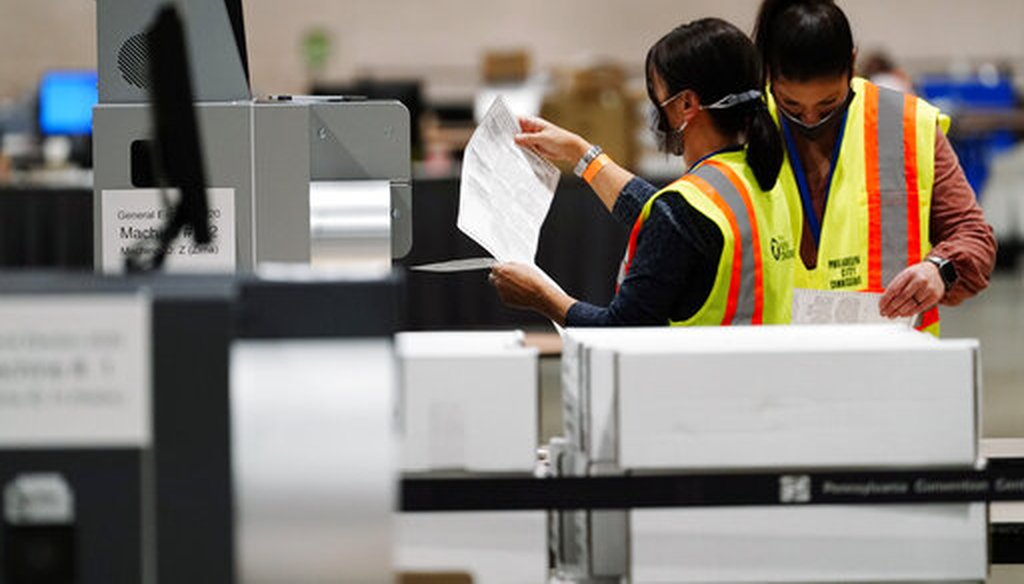

Our only agenda is to publish the truth so you can be an informed participant in democracy.
We need your help.


Philadelphia election workers scan in ballots for the general election, at the Pennsylvania Convention Center, Tuesday, Nov. 3, 2020, in Philadelphia. (AP)
As part of his relentless campaign against the results of the 2020 presidential election, President Donald Trump on Nov. 13 invoked an old case of voter fraud perpetrated by Philadelphia Democrats that altered the result of a state Senate election.
"Wow. This is exactly what happened to us. Great courage by judge!" Trump tweeted, referring to a federal judge’s determination that Democrats had orchestrated a "massive scheme" involving absentee ballots to win a pivotal 1993 race. The judge later removed the Democratic candidate from office and installed his Republican challenger.
But nothing like what happened nearly three decades ago occurred during the 2020 election in Philadelphia or anywhere else. In fact, none of the lawsuits the Trump campaign filed in Pennsylvania after the Nov. 3 election contains even one allegation — let alone evidence — of a single vote being cast illegally because of absentee-ballot fraud.
So what happened in 1993?
Pennsylvania held a special election to replace a Democratic state senator from North Philadelphia who died in office. Most of the voters in the area he represented were registered Democrats, but turnout in previous elections had been low, and the balance of power in the state Senate was on the line.
Whichever party won the special election was poised to capture a majority in the upper house.
To ensure that Democrat William Stinson would win, three Philadelphia election officials illegally delivered hundreds of absentee ballot packets to Stinson’s campaign. Staffers then distributed the packets to voters who didn’t qualify at the time to vote absentee, instructed them in some cases to vote for Stinson, and delivered the ballots to the Board of Elections.
The case wound up in federal court after state election officials and state courts rejected Republicans’ claims about impropriety.
"Stinson knew of and ratified the procedures, and the board participated in and later tried to conceal its involvement in the scheme," U.S. District Judge Clarence C. Newcomer said at the time. In February 1994, Newcomer took the unprecedented step of invalidating all 1,757 absentee ballots cast in the election.
Back then, voters were allowed to request absentee ballots only if they were too sick to vote in person or planned to be out of the city on election day. Newcomer heard testimony from dozens of voters who said the Stinson campaign led them to believe the law had changed and they were now allowed to vote from home just for convenience. In dozens of other cases, the campaign simply forged the signature of voters.
In the end, Newcomer ordered that Stinson, a then 49-year-old former assistant deputy mayor of Philadelphia, be removed from office and that Republican Bruce Marks, a then 36-year-old lawyer and former aide to U.S. Sen. Arlen Specter, replace him.
"This is extraordinary relief," Newcomer wrote in February 1994. "However, it is appropriate because extraordinary conduct by the Stinson campaign and the board tainted the entirety of the absentee ballots."
The following month, The Philadelphia Inquirer published an exhaustive examination of the absentee ballots cast in the Stinson-Marks contest and revealed that 540 absentee ballots, nearly a third of the total, were tainted by some form of improper conduct, including voters’ signatures being forged, ballots cast in the names of dead or out-of-district voters, and campaign workers marking ballots themselves. The race was close enough to turn the loss into a win for the Democrats.
The 2020 presidential election and this 1993 state Senate special election differ in several key ways.
Campaigns are still barred from distributing absentee ballots to voters, but Pennsylvania now allows residents to vote by mail without giving a reason — the very conduct that was barred during the 1993 special election.
And critically, unlike the Marks campaign, which sought relief for specific allegations of voter fraud, the Trump campaign has not alleged in court that any mail ballots were intentionally cast illegally. Rather, the campaign has been seeking to disqualify ballots submitted by lawful voters based on claims about counting procedures and other rules.
Trump tweeted that a 1993 example of voter fraud in Philadelphia is "exactly what happened to us" in the 2020 election.
It is not, and there is no evidence the Trump campaign is making that argument in court. The 1993 case at the heart of Trump’s tweet involved a rare, verified case of voter fraud. The Trump campaign has not alleged a specific case of voter fraud in Pennsylvania, and there is no evidence of any. Trump’s statement is not accurate and makes a ridiculous claim.
We rate it Pants on Fire.
The Philadelphia Inquirer, "Trump’s legal push to disrupt Pa.’s election results is on its last legs. What’s his campaign still fighting in court?" Nov. 16, 2020
The Philadelphia Inquirer, "U.S. Judge Voids Stinson’s Election," Feb. 19, 1994
The Philadelphia Inquirer, "Improper Ballots Turned Election: A review indicates 540 were tainted," March 25, 1994
The Philadelphia Inquirer, "In the end, 20 people charged with fraud," March 17, 1996
The Philadelphia Inquirer, "Rendell aide blamed in 2D district fraud," March 17, 1996
The New York Times, "Vote-Fraud Ruling Shifts Pennsylvania Senate," Feb. 19, 1994
In a world of wild talk and fake news, help us stand up for the facts.
